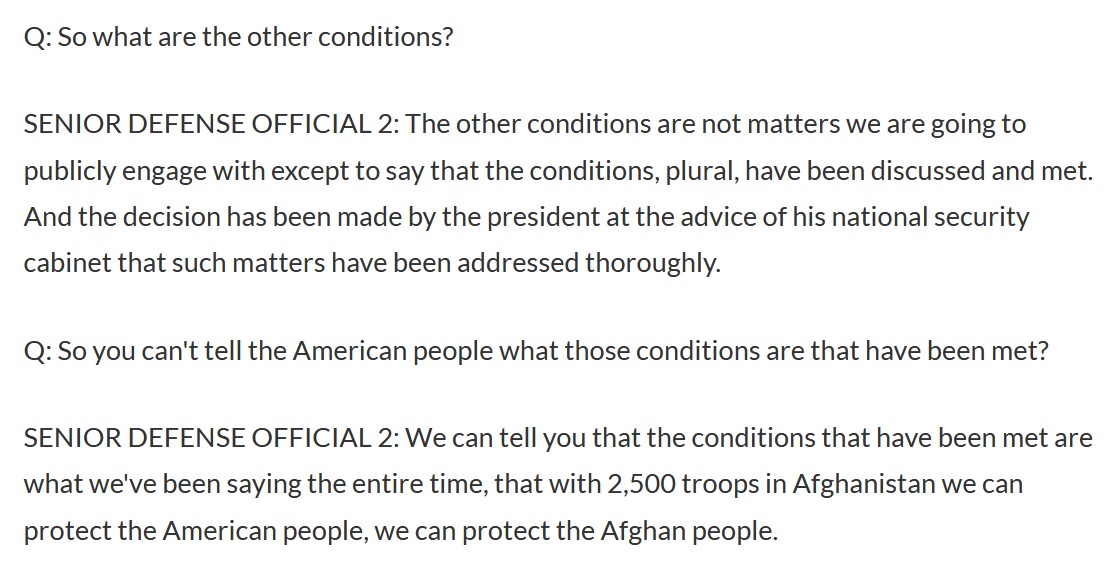The transcript of a background call with Pentagon reporters about Afghanistan was published on the Defense Department website.
It reaffirms something: The truth was not told on Tuesday, deliberately or otherwise. https://www.defense.gov/Newsroom/Transcripts/Transcript/Article/2421804/senior-defense-officials-provide-background-briefing-on-afghanistan-and-iraq-tr/source/GovDelivery/
It reaffirms something: The truth was not told on Tuesday, deliberately or otherwise. https://www.defense.gov/Newsroom/Transcripts/Transcript/Article/2421804/senior-defense-officials-provide-background-briefing-on-afghanistan-and-iraq-tr/source/GovDelivery/
In the call, one of the senior officials stated that the decision to cut additional troops in Afghanistan "comes at the recommendation of the senior-most military officials."
That, we know, is false.
That, we know, is false.
The reality is, senior military officials recommended keeping the number of troops there the same at this time. We know that because of the memo referenced here, which was informed by the recommendations of generals. https://www.washingtonpost.com/national-security/trump-pentagon-afghan-war/2020/11/13/5ac54c7e-25cb-11eb-8599-406466ad1b8e_story.html
I raised that point in the call. Others, including @TBowmanNPR pressed for information about what conditions have been met to warrant a continued downsizing.
In his announcement, acting SECDEF Miller then said the decision was "based on continuous engagement" with Trump's "national security Cabinet over the past several months."
Those are not military officials. Those are political appointees.
Those are not military officials. Those are political appointees.
This brings us to an important point: While some administration officials have cast this as something senior commanders wanted, that's not the case.
The administration doesn't have to play it this way.
They could point out that the Pentagon has a long history of coloring the truth on what "progress" in Afghanistan looks like.
They could say that after 19 years, the conditions on the ground are less important than other factors at home.
They could say that after 19 years, the conditions on the ground are less important than other factors at home.
We basically know where Trump is on this issue.
After Mattis resigned, Trump said: "What’s he done for me? How has he done in Afghanistan? Not too good. Not too good. I’m not happy with what he’s done in Afghanistan, and I shouldn’t be happy.”
After Mattis resigned, Trump said: "What’s he done for me? How has he done in Afghanistan? Not too good. Not too good. I’m not happy with what he’s done in Afghanistan, and I shouldn’t be happy.”
Anyway, this is my facts-based analysis of the day: The military's top generals were consulted on this decision, and will do doubt have to shape it going forward. But they didn't as a group say it was a good idea.
Plenty of past presidents, including Obama and Bush, have disregarded recommendations in the past. There's plenty of precedent for it.
No reason to pretend this isn't another example of the same.
No reason to pretend this isn't another example of the same.

 Read on Twitter
Read on Twitter


